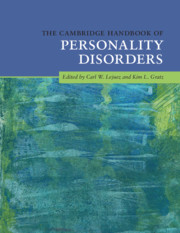Book contents
- The Cambridge Handbook of Personality Disorders
- The Cambridge Handbook of Personality Disorders
- Copyright page
- Contents
- Figures
- Tables
- Contributors
- Preface
- Part I Etiology
- Part II Models
- 5 Controversies in the Classification and Diagnosis of Personality Disorders
- 5a Three Unresolved Conceptual Issues in Personality Disorders: Commentary on Controversies in the Classification and Diagnosis of Personality Disorders
- 5b Classification of Complex Disorders Is a Challenge Solved by Simplicity: Commentary on Controversies in the Classification and Diagnosis of Personality Disorders
- 5c Final Thoughts: Author Rejoinder to Commentaries on Controversies in the Classification and Diagnosis of Personality Disorders
- 6 Categorical Models of Personality Disorders
- 6a Good Taxonomy Can Address Classification Challenges in Personality Pathology by Providing Informative Priors That Balance Information Compression and Fidelity: Commentary on Categorical Models of Personality Disorders
- 6b A Hierarchical, Dimensional Approach Can Advance Personality Disorder Research: Commentary on Categorical Models of Personality Disorders
- 6c The Search for Clinically Meaningful Dimensions Requires a Clinical Theory: Author Rejoinder to Commentaries on Categorical Models of Personality Disorders
- 7 The Five-Factor Model of Personality Disorders
- 7a Personality Disorders are Disorders of Personality: Commentary on the Five-Factor Model of Personality Disorders
- 7b Assessment and Operationalization of Personality Disorders from a Five-Factor Model Perspective: Commentary on the Five-Factor Model of Personality Disorders
- 7c Challenges but Optimism Regarding the Adoption of Trait Models of Personality Disorders: Author Rejoinder to Commentaries on the Five-Factor Model of Personality Disorders
- 8 Interpersonal Models of Personality Pathology
- 8a Interpersonal Nuance in Context: Commentary on Interpersonal Models of Personality Pathology
- 8b Contextual Dynamics in the Interpersonal Theory of Personality and Personality Disorder: Commentary on Interpersonal Models of Personality Pathology
- 8c Expanding on Interpersonal Models of Personality Pathology: Author Rejoinder to Commentaries on Interpersonal Models of Personality Pathology
- Part III Individual Disorders and Clusters
- Part IV Assessment
- Part V Treatment
- Index
- References
6c - The Search for Clinically Meaningful Dimensions Requires a Clinical Theory: Author Rejoinder to Commentaries on Categorical Models of Personality Disorders
from Part II - Models
Published online by Cambridge University Press: 24 February 2020
- The Cambridge Handbook of Personality Disorders
- The Cambridge Handbook of Personality Disorders
- Copyright page
- Contents
- Figures
- Tables
- Contributors
- Preface
- Part I Etiology
- Part II Models
- 5 Controversies in the Classification and Diagnosis of Personality Disorders
- 5a Three Unresolved Conceptual Issues in Personality Disorders: Commentary on Controversies in the Classification and Diagnosis of Personality Disorders
- 5b Classification of Complex Disorders Is a Challenge Solved by Simplicity: Commentary on Controversies in the Classification and Diagnosis of Personality Disorders
- 5c Final Thoughts: Author Rejoinder to Commentaries on Controversies in the Classification and Diagnosis of Personality Disorders
- 6 Categorical Models of Personality Disorders
- 6a Good Taxonomy Can Address Classification Challenges in Personality Pathology by Providing Informative Priors That Balance Information Compression and Fidelity: Commentary on Categorical Models of Personality Disorders
- 6b A Hierarchical, Dimensional Approach Can Advance Personality Disorder Research: Commentary on Categorical Models of Personality Disorders
- 6c The Search for Clinically Meaningful Dimensions Requires a Clinical Theory: Author Rejoinder to Commentaries on Categorical Models of Personality Disorders
- 7 The Five-Factor Model of Personality Disorders
- 7a Personality Disorders are Disorders of Personality: Commentary on the Five-Factor Model of Personality Disorders
- 7b Assessment and Operationalization of Personality Disorders from a Five-Factor Model Perspective: Commentary on the Five-Factor Model of Personality Disorders
- 7c Challenges but Optimism Regarding the Adoption of Trait Models of Personality Disorders: Author Rejoinder to Commentaries on the Five-Factor Model of Personality Disorders
- 8 Interpersonal Models of Personality Pathology
- 8a Interpersonal Nuance in Context: Commentary on Interpersonal Models of Personality Pathology
- 8b Contextual Dynamics in the Interpersonal Theory of Personality and Personality Disorder: Commentary on Interpersonal Models of Personality Pathology
- 8c Expanding on Interpersonal Models of Personality Pathology: Author Rejoinder to Commentaries on Interpersonal Models of Personality Pathology
- Part III Individual Disorders and Clusters
- Part IV Assessment
- Part V Treatment
- Index
- References
Summary
In this rejoinder the author responds to the commentaries to the chapter. While the commentaries favor taxomonetric/categorical vs. dimensional approaches, the author explores various possibilities to integrate these two perspectives. Such an approach would better fit research finding and allows for preservation of the merits of each approach. Such integration has to resolve such challenges as definition of conceptually and clinically meaningful dimensions, identification of the disorder-specific concepts that are not dimensional, conceptualization of orthogonal dimensions, and integration of the dimensional and categorical approaches through identification of moderators.
Keywords
- Type
- Chapter
- Information
- The Cambridge Handbook of Personality Disorders , pp. 143 - 144Publisher: Cambridge University PressPrint publication year: 2020



